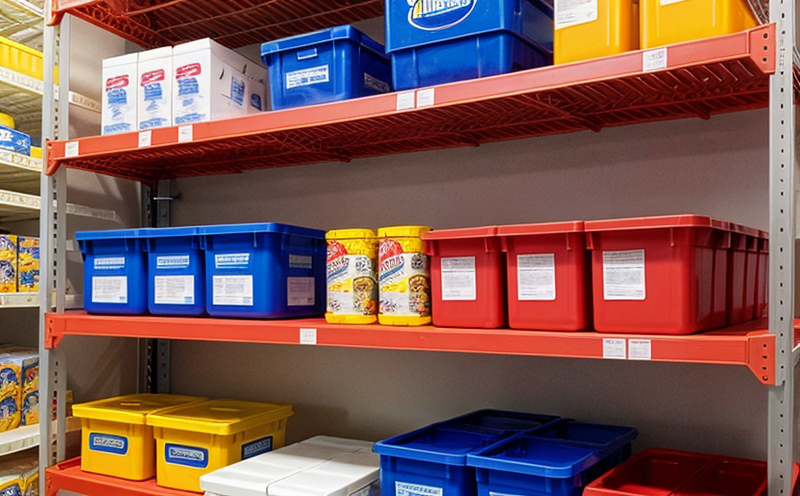ISO 119476 Shelf Life Studies in Dairy-Based Snacks
The shelf life study per ISO 11947-6 is a critical component of quality assurance for dairy-based snacks. This standard ensures that the integrity and safety of products are maintained over time, particularly focusing on the stability of fats, proteins, and sugars in these products. Shelf life studies are essential for food safety compliance, product labeling accuracy, and consumer trust.
The process involves controlled storage under various conditions to observe changes over time. This can include temperature variations that simulate different environments from cold storage to ambient temperatures common in retail outlets. By conducting such studies, manufacturers can determine the optimal shelf life of their products, ensuring they remain safe for consumption well beyond initial packaging dates.
Accurate shelf life determination is paramount not only for compliance with international standards but also for maintaining brand reputation and consumer safety. Shelf life studies help identify potential risks associated with extended storage periods, such as rancidity in fats or spoilage due to microbial growth, which can affect taste, texture, and nutritional value.
For dairy-based snacks, the focus is on monitoring lipid oxidation, protein denaturation, and sugar degradation. These changes are critical because they influence both product quality and safety. Lipid oxidation, for instance, leads to off-flavors that consumers find unpalatable. Protein denaturation alters nutritional content and potentially impacts allergenicity. Understanding these parameters allows for precise formulation adjustments and better labeling.
Instruments used in this process include moisture analyzers, fat testers, and colorimeters among others. These tools provide quantitative data on physical properties like moisture content, fat levels, and color stability which are crucial indicators of product quality during prolonged storage.
Compliance with ISO 11947-6 is mandatory for manufacturers aiming to export products internationally or meet stringent local regulations. Failure to adhere could result in product recalls, legal action, and loss of market share. Consequently, investing in thorough shelf life studies is not just a regulatory requirement but also a strategic business decision.
| Parameter | Description | Method |
|---|---|---|
| Lipid Oxidation | Measures the extent of fatty acid peroxidation and formation of volatile compounds. | Automatic Sample Preparation System (ASPS) |
| Protein Denaturation | Quantifies the degree of protein unfolding under denaturing conditions. | Differential Scanning Calorimeter (DSC) |
| Sugar Degradation | Evaluates changes in sugar content due to hydrolysis or Maillard reactions. | Polarimetry |
Understanding the shelf life of dairy-based snacks is crucial for several reasons. Firstly, it helps ensure product safety by identifying potential hazards that may arise during extended storage periods. Secondly, accurate determination allows manufacturers to set realistic expiration dates, promoting consumer trust and satisfaction. Lastly, this knowledge supports sustainable supply chain management by optimizing inventory levels and reducing waste.
Why It Matters
The importance of shelf life studies cannot be overstated in the food industry, especially for dairy-based snacks which are sensitive to environmental factors such as temperature and humidity. Properly conducted shelf life tests ensure that products remain safe and palatable throughout their intended shelf life.
- Ensures compliance with international standards like ISO 11947-6
- Reduces the risk of product recalls due to quality issues
- Enhances consumer trust through accurate labeling and consistent product quality
- Supports sustainable practices by optimizing inventory management
The potential consequences of neglecting shelf life studies are significant. Non-compliance with regulations can lead to legal action, financial penalties, and damage to brand reputation. Moreover, substandard products pose health risks to consumers, leading to public safety concerns.
Conversely, rigorous adherence to these standards brings numerous benefits. Not only does it enhance product quality but also fosters innovation within the industry. By continuously refining shelf life testing methodologies, manufacturers can improve their offerings and stay ahead of competitors.
Quality and Reliability Assurance
Shelf life studies are integral to maintaining high standards of quality and reliability in dairy-based snacks. These tests ensure that products meet not only regulatory requirements but also the expectations of consumers who rely on consistent product performance.
The process involves meticulous planning and execution, starting with selecting appropriate test samples representing different batches or formulations. Samples must be stored under controlled conditions simulating real-world scenarios where they might encounter varying temperatures and humidities over extended periods.
Regular monitoring throughout the study period allows for timely detection of any adverse changes indicative of compromised product integrity. This data is then analyzed using statistical methods to establish a reliable estimate of shelf life, ensuring that products are safe and enjoyable up until their expiration date.
The use of advanced analytical techniques like HPLC (High Performance Liquid Chromatography), GC-MS (Gas Chromatography-Mass Spectrometry), and FTIR (Fourier Transform Infrared spectroscopy) provides detailed insights into the chemical composition and structural modifications occurring during storage. These findings are crucial for understanding how specific factors influence product stability over time.
Comprehensive documentation of all test procedures, results, and conclusions is essential to support regulatory compliance and internal quality assurance processes. This documentation serves as a valuable resource for future reference, enabling continuous improvement in manufacturing practices and formulation adjustments based on real-world performance data.





